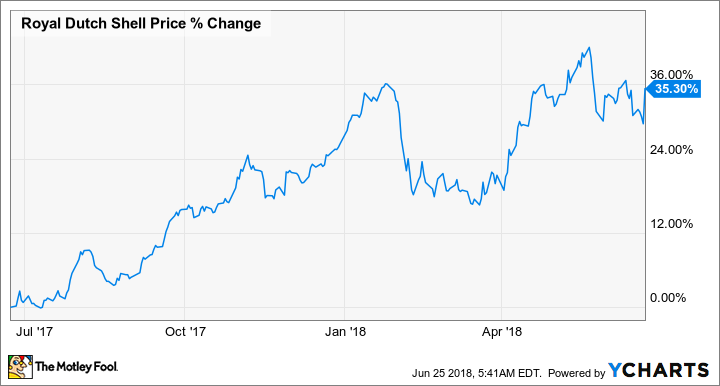3 Revealing Quotes From Royal Dutch Shell's Management
Listening to earnings conference calls can be a bit of a dull affair. Too often, management either champions its work when a quarter goes well or finds something to blame when the business underperforms. Every time, though, there are a bunch of wonky questions from analysts looking to make their hay by predicting the next quarter's results as precisely as possible. For a long-term investor, it hardly seems worth slogging through these calls.
On occasion, though, a corporate executive can make a few points that reveal a lot about the company or the industry in which they work. That was certainly the case during Royal Dutch Shell's (NYSE: RDS-A) (NYSE: RDS-B) most recent conference call. Here are a few quotes from Shell CFO Jessica Uhl that are worth considering if you are an investor in Shell or just the oil and gas industry as a whole.

Image source: Getty Images.
LNG is a very good business
Shell has made it clear that it sees a lucrative future in the entire value chain in liquefied natural gas (LNG). Not only has the company invested heavily in facilities to produce LNG, but it is taking a prominent role in LNG trading, shipping, and regasification facilities to receive the fuel. Thanks to new facilities coming on line and the addition of BG Group's LNG assets, Shell's LNG business is growing at staggering rates. Here's what Uhl said regarding the company's most recent results from its LNG business:
With the acquisition of BG, we accelerated our growth in LNG by a decade and this growth is being delivered quarter after quarter with record liquefaction volumes achieved in Q1 2018. Since 2015, we've increased our equity LNG liquefaction by some 50% and our LNG sales by some 75%.
No investor should expect Shell's LNG business to grow at these rates in the future, but Uhl did make it clear that LNG is the fastest-growing segment of the oil and gas industry. As a result, Shell sees itself investing heavily in the industry for years to come:
Demand for LNG is expected to continue growing in the 2020s at an average growth rate of more than 4% per year because of continued economic growth and policies that support switching from coal to gas to bring down local air pollution and reduce CO2 emissions.
As a leading [integrated oil company] in the LNG market, we are well-positioned to benefit from this growing market and our strategy and capital allocation profile are designed to maintain our market share. Moreover, we see a potential supply gap appearing in the early 2020s. Therefore, we continue to look at opportunities to increase our supply portfolio.
Shell's more than 34 million tons per year of liquefaction capacity puts it well ahead of its peers, and the company has another nine facilities in various phases of development that would build on that position even more. Considering how long it takes to build out LNG facilities, we won't likely see an impact from these expansion opportunities until the early to mid-2020s, but with a shortage of LNG expected as early as 2022, there will be ample opportunities to grow the business.
The industry is more efficient now
It wasn't that long ago that oil companies struggled to make money when a barrel of crude cost less than $90. Recently, though, companies are now touting new production sources that can be profitable at $50 a barrel or less. As astounding as that sounds, I'm guessing there are some skeptics out there who say achieving such incredible cost savings can only be temporary or a product of cheap service contracts.
That is certainly part of the reason why costs have declined so much, but it isn't the entire story. One thing that offshore players like Shell did was go back to the drawing board to better design their new projects. Here's Uhl describing how Shell was able to significantly lower the cost of its Vito development in the Gulf Coast:
Vito is one of our most competitive and resilient projects with a forward-looking breakeven price of less than $35 per barrel, enabling positive returns and cash even in a lower oil price scenario.
This is driven by the significant transformation the project underwent to improve capital efficiency. Since the initial concept, we have taken 70% of the capital cost out by fundamentally redesigning the project. The initial Vito concept required new technology and was designed to be a much larger project. By applying industry standard designs, we simplified the scope. This resulted in a simpler and smaller project working from the minimum requirements needed, while maintaining safety and asset integrity.
This is a very telling sign of the changing times. Shell has historically been the integrated major to take on the tougher projects and the most likely to implement state-of-the-art technologies and development plans (sometimes to the detriment of shareholder returns). A project where Shell uses off-the-shelf designs and equipment is a sign that Shell is much more focused on the bottom line.
It may be a little frustrating to see that it took an epic oil crash for these companies to get their acts together when it comes to cost control, but better late than never.
Capital priorities leaning in investors' favor?
So far, Shell has delivered on several of the promises it made when it acquired BG Group. It said that the company would sell off several billion in assets that weren't generating great returns, invest in its highest-return areas like LNG, and trim its debt balance. The one thing that management has not yet done as part of those promises is buy back significant chunks of stock.
The decision to buy back that much stock was part of the plan that CEO Ben van Beurden and former CFO Simon Henry put together when the BG Group merger was announced. Uhl has since taken over for Henry in the CFO role, and it seems thus far that her approach to capital allocation is a bit more conservative than Henry's. While the plan to buy back stock is still in the works, Uhl has emphasized that it will only happen when other cash-generating and balance-sheet hurdles are cleared:
Consistent with these cash flow priorities, we apply the following principles to capital allocation. Firstly, divestment proceeds are allocated with priority to reduce debt. Secondly, through the cycle, dividends, net interest payments, and capital investment should be covered by cash flow from operations. If necessary, capital investment can be reduced to maintain this balance. However, capital investments will not be increased in case of excess cash flow generation. Any excess will be allocated to debt reduction and shareholder distributions. These principles and the discipline with which we apply them are important for us to deliver on our $25 billion share buyback intent and the world-class investment case.
Those that are a little impatient might be a little discouraged with this plan because it prolongs the period over which this share repurchase plan will take place. However, those looking to invest in Shell over a very long time horizon should be encouraged by the stricter capital discipline that Uhl is implementing here. The company is already generating gobs of cash under this new model, so there is little need to carry much debt on the balance sheet. Clearing the balance sheet when times are good could also make it possible for the company to make another aggressive move in the event of another industry downturn.
More From The Motley Fool
Tyler Crowe has no position in any of the stocks mentioned. The Motley Fool has no position in any of the stocks mentioned. The Motley Fool has a disclosure policy.

 Yahoo Finance
Yahoo Finance 
